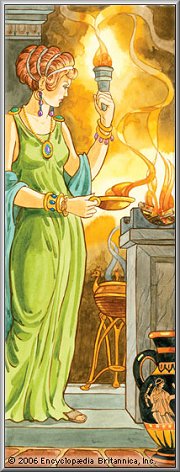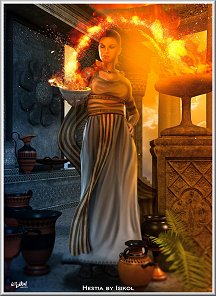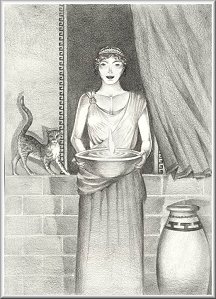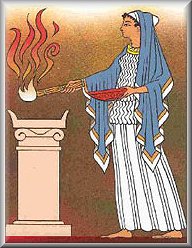
(c) Encyclopedia Britannica
Hestia

Hestia
CLICK
TO ENLARGE

Hestia
CLICK TO
ENLARGE
|
HESTIA PAGE ONE
Hestia is the daughter of Cronus and Rhea and the sister of
Zeus, Hades, Poseidon, Demeter and Hera. She was the firstborn
of the Olympians and is the goddess of fire, particularly the
hearth, the symbol of the house around which a new born child is
carried before it is received into the family.
Hestia was also the lastborn of the Olympians - When Cronus
swallowed his children because he feared they would overthrow
him, Hestia was the first to be devoured and the last to be
yielded up again. Hence, she was the oldest, as well as the
youngest.
Her name translates to 'hearth and home', what the Greeks call
the 'oikos', and Hestia was arguably the most revered goddess in
ancient Greece and Rome, universally loved by all. Her
residences were Olympus and Delphi.
The center of Greek life was the domestic hearth, which was also
used as a sacrificial altar. The hearth provided warmth, enabled
the preparation of food, and served to complete the sacrificial
functions. Hestia would receive the first offering of every
meal, albeit a modest one.
Hestia, as the goddess of the hearth, represented personal
security and happiness, and the sacred duty of hospitality. She
was considered the patron goddess of architecture as well.
The leading woman of the house would be responsible for the
worship of Hestia, but sometimes a man would perform the duties.
With the establishment of any new town or colony, Hestia's
sacred flame from the public hearth in the mother city would be
brought along to the new settlement.
Hestia was anything but pretentious, choosing to sit on a plain
wooden throne with a white wool cushion, unlike the other
Olympians who were far more ostentatious. She did not even
choose an emblem for herself, being too modest.
In classical Greek art Hestia is depicted as a plain woman
modestly dressed in a head veil, sometimes holding a staff.
She is one of the three virgin goddesses, although both Apollo
and Poseidon wooed her as rival suitors following the
dethronement of Cronus by Zeus.
Hestia at that time swore by Zeus's head to remain a virgin
forever and Zeus rewarded her efforts to keep peace among the
two gods by awarding her the first offering of every public
sacrifice. In that sense, Hestia was the opposite of Aphrodite,
goddess of love, having rejected her values and choosing
chastity instead.
Her temples were circular and served by virgin priestesses who
dedicated their lives to her. Each city also had a public hearth
sacred to Hestia, where the fire was never allowed to go out.
Many triangular or leaf-shaped ladles in stone or clay have been
discovered in Cretan and Mycenaean shrines - these seem to have
been used for tending the sacred fire.
As goddess of the hearth, she never left the 'lofty adobe of
the eternal gods' (Hesiod, Theogony) and never intervened
in the stormy history, petty infighting and intrigue of the
gods. Zeus tasked her with feeding and maintaining the fires of
the Olympus hearth with the fatty portions of offerings to the
gods.
Alone among the great Olympians, she never took part in wars or
disputes. She was the central point, the meeting place, and
received the first part of every sacrifice. She's charitable to
those who flee to her for protection.
If it were a beauty pageant up on Mount Olympus, surely Hestia
would win Miss Congeniality!
Hestia, in all dwellings of men and
immortals
Yours is the highest honor, the sweet wine
offered
First and last at the feast, poured out to
you duly.
Never without you can gods or mortals hold
banquet.
An offering to Hestia at the beginning of each meal
Hestia, you who tend the holy house of
the lord Apollo,
the Far-shooter at goodly Pytho,
Hestia, with soft oil dripping ever from
your locks,
come now into this house, come,
having one mind with Zeus the all-wise:
draw near, and withal bestow grace upon my
song.
Homeric Hymn to Hestia
 HESTIA
CONTINUED ON
PAGE TWO
HESTIA
CONTINUED ON
PAGE TWO


Hestia continues on page two!
Lots more info and pix - Click here!

[home] [page one]
[page two]
|







